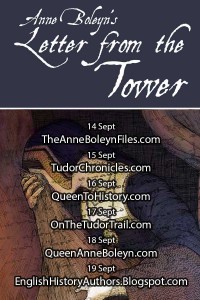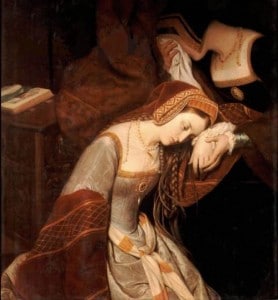 Today I’m delighted to welcome author Sandra Vasoli to The Anne Boleyn Files on the first stop of her book/blog tour for Anne Boleyn’s Letter from the Tower: A New Assessment which has just been released as a kindle book and paperback. It’s a meticulously researched book and is an excellent read – congratulations Sandi!
Today I’m delighted to welcome author Sandra Vasoli to The Anne Boleyn Files on the first stop of her book/blog tour for Anne Boleyn’s Letter from the Tower: A New Assessment which has just been released as a kindle book and paperback. It’s a meticulously researched book and is an excellent read – congratulations Sandi!
Giveaway – MadeGlobal Publishing is offering one copy of the paperback version of Anne Boleyn’s Letter from the Tower as a prize for one lucky commenter. All you have to do to enter the giveaway is to comment below saying what you think about this letter. You need to leave your comment by midnight (UK time) on Friday 18th September. The winner will be picked at random and contacted for his/her postal address. The giveaway is open internationally.
Over to Sandi…
This week, my book Anne Boleyn’s Letter from the Tower: A New Assessment becomes available by MadeGlobal Publishing. I am extremely grateful to Claire for giving me the opportunity to write a blog post related to the book’s content upon its publication.
This topic – an enigmatic, poignant, beautifully composed letter which was found in Thomas Cromwell’s personal belongings after his death, asserted to have been sent from the imprisoned Anne Boleyn with the purpose of being read by her husband, Henry VIII – is a subject of fascination for many. It has been so for the 475 years since its discovery. My keen interest led me to conduct research on and about this letter and its possible provenance; my study was thorough. However, can we learn more about its history? Of course – as is always the way when we attempt to recreate the past. Scientific techniques improve every day which allow us to better assess facts leading to conclusions. Readers of The Anne Boleyn Files have commented, asking if the letter itself has ever been subject to scientific analysis. To my knowledge, it has not, so we continue to rely on visual examination and circumstantial evidence to bring its story to life.
There is, in my view, a clue to the letter’s origination which is as important as any scientific or forensic fact. That is the letter’s content and how it is expressed: its elocution. What has been said, and how, on the page written so long ago gives us a sharp insight into who authored it. Although I understand that my argument is subjective, I would like to present it to today’s readers.
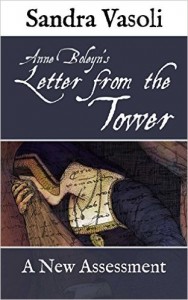 There are not many examples of speech or writings that we can ascribe definitively to Anne. We have the letter she wrote to her father while away in France at a young age – but that was a letter in which she practised her French, and it’s clearly the letter of a teen dutifully writing to her father. There are, though, several letters Anne had written to Cardinal Wolsey as she and Henry awaited Wolsey’s influence on the Pope to allow the dissolution of the marriage between Henry and Katherine of Aragon. These letters use language that is exceedingly polite, as was the custom of the day, and also adopt a tone that is almost cloying in its congeniality. (We know that Anne was not a fan of Wolsey’s during the time that the letters were written, but clearly she understood the power of complimentary persuasion). That being said, the innate style and the selection of words in those documents are not so different from the Tower Letter. Based upon this evidence alone, it is not unreasonable to think that one individual authored all of the letters.
There are not many examples of speech or writings that we can ascribe definitively to Anne. We have the letter she wrote to her father while away in France at a young age – but that was a letter in which she practised her French, and it’s clearly the letter of a teen dutifully writing to her father. There are, though, several letters Anne had written to Cardinal Wolsey as she and Henry awaited Wolsey’s influence on the Pope to allow the dissolution of the marriage between Henry and Katherine of Aragon. These letters use language that is exceedingly polite, as was the custom of the day, and also adopt a tone that is almost cloying in its congeniality. (We know that Anne was not a fan of Wolsey’s during the time that the letters were written, but clearly she understood the power of complimentary persuasion). That being said, the innate style and the selection of words in those documents are not so different from the Tower Letter. Based upon this evidence alone, it is not unreasonable to think that one individual authored all of the letters.
What causes the letters to Wolsey and the Tower Letter to differ is the unmistakable, raw honesty which jumps from the page composed in the Tower. As I read the words over and over, I was struck by how real they felt to me as a woman. I could not help but imagine that if, in some strange time transport, I were in Anne’s unfortunate shoes, I would want to express the same emotions to my husband. This conviction has grown stronger for me with each and every reading of the letter. It is important to note that, while affording Henry the respectful salutation due a king in the opening lines, and demonstrating awareness that he holds her fate in his hands, the composition of the message itself is purely one from a wife to her husband.
Let’s look at each paragraph:
Sir, your Grace’s displeasure, and my Imprisonment are Things so strange unto me, as what to Write, or what to Excuse, I am altogether ignorant; whereas you sent unto me (willing me to confess a Truth, and so obtain your Favour) by such a one, whom you know to be my ancient and professed Enemy; I no sooner received the Message by him, than I rightly conceived your Meaning; and if, as you say, confessing Truth indeed may procure my safety, I shall with all Willingness and Duty perform your Command.
Here Anne begins by expressing her shock and displeasure at having been so caught off guard, and in not even understanding what Henry’s complaint might possibly be, since she is completely and utterly innocent. She is annoyed with him that he arranged for her uncle, the Duke of Norfolk, to arrest her – since Henry was well aware they did not get along. She says that she is quite happy to bend to his ‘Command’ to tell the truth. I detect the slightest tinge of sarcasm in her statement that with all willingness and duty she will perform his Command. How like a wife who has been caught off guard with an empty accusation!
But let not your Grace ever imagine that your poor Wife will ever be brought to acknowledge a Fault, where not so much as Thought thereof proceeded. And to speak a truth, never Prince had Wife more Loyal in all Duty, and in all true Affection, than you have found in Anne Boleyn, with which Name and Place could willingly have contented my self, as if God, and your Grace’s Pleasure had been so pleased. Neither did I at any time so far forge my self in my Exaltation, or received Queenship, but that I always looked for such an Alteration as now I find; for the ground of my preferment being on no surer Foundation than your Grace’s Fancy, the least Alteration, I knew, was fit and sufficient to draw that Fancy to some other subject.
You have chosen me, from a low Estate, to be your Queen and Companion, far beyond my Desert or Desire. If then you found me worthy of such Honour, Good your Grace, let not any light Fancy, or bad Counsel of mine Enemies, withdraw your Princely Favour from me; neither let that Stain, that unworthy Stain of a Disloyal Heart towards your good Grace, ever cast so foul a Blot on your most Dutiful Wife, and the Infant Princess your Daughter.
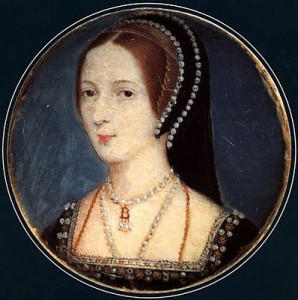 These paragraphs are just so telling. In my mind, it is pure Anne. With just a detectable note of mockery, she names herself his ‘poor Wife’ and states clearly that what she is accused of was never even a thought in her mind. She states flat out that she loved him truly – and that he found her when she was merely Anne Boleyn and that she would have been happy to remain Anne Boleyn had he not pursued her. She admits to being well aware their relationship was based on love, and should he ever fall out of love with her, her position would no longer be viable. She is open and forthright with no hint of submissive groveling, even though her life is at stake.
These paragraphs are just so telling. In my mind, it is pure Anne. With just a detectable note of mockery, she names herself his ‘poor Wife’ and states clearly that what she is accused of was never even a thought in her mind. She states flat out that she loved him truly – and that he found her when she was merely Anne Boleyn and that she would have been happy to remain Anne Boleyn had he not pursued her. She admits to being well aware their relationship was based on love, and should he ever fall out of love with her, her position would no longer be viable. She is open and forthright with no hint of submissive groveling, even though her life is at stake.
Try me, good King, but let me have a Lawful Trial, and let not my sworn Enemies sit as my Accusers and Judges; yes, let me receive an open Trial, for my Truth shall fear no open shame; then shall you see, either mine Innocency cleared, your Suspicion and Conscience satisfied, the Ignominy and Slander of the World stopped, or my Guilt openly declared. So that whatsoever God or you may determine of me, your Grace may be freed from an open Censure; and mine Offence being so lawfully proved, your Grace is at liberty, both before God and Man, not only to execute worthy Punishment on me as an unlawful Wife, but to follow your Affection already settled on that party, for whose sake I am now as I am, whose Name I could some good while since have pointed unto: Your Grace being not ignorant of my Suspicion therein.
Anne seems to believe that Henry will provide her a fair and open trial – and focuses on her ability to convince the panel of her innocence, which will then stop the travesty of her accusation: the ‘Ignominy and Slander of the World’. She adds that, once she is cleared, he will no longer feel humiliated, and can proceed with his affair. The affair that, as she reminds him, she is well aware of – and has told him so. How dramatic! And how like arguments between spouses!
But if you have already determined of me, and that not only my Death, but an Infamous Slander must bring you the enjoying of your desired Happiness; then I desire of God, that he will pardon your great Sin therein, and likewise mine Enemies, the Instruments thereof; that he will not call you to a strict Account for your unprincely and cruel usage of me, at his General Judgement-Seat, where both you and my self must shortly appear, and in whose Judgement, I doubt not, (whatsover the World may think of me) mine Innocence shall be openly known, and sufficiently cleared.
This passage is simply amazing, yet not at all difficult to imagine coming from Anne. She lets Henry have it with full force. With that same hint of mockery she terms her situation as the ‘Infamous Slander’ (could it be a play on Henry’s ‘Great Matter’?) and proceeds in no uncertain terms to tell him that if his ‘Happiness’ is dependent on such slander, she worries not for herself, because she will be proclaimed innocent in heaven – but instead her concern is for him and how he will fare when he meets God – where, by the way, they must both ‘shortly appear.’
My last and only Request shall be, That my self may only bear the Burthen of your Grace’s Displeasure, and that it may not touch the Innocent Souls of those poor Gentlemen, who (as I understand) are likewise in strait Imprisonment for my sake. If ever I have found favour in your Sight; if ever the Name of Anne Boleyn hath been pleasing to your Ears, then let me obtain this Request; and I will so leave to trouble your Grace any further, with mine earnest Prayers to the Trinity to have your Grace in his good keeping, and to direct you in all your Actions.
Your most Loyal and ever Faithful Wife, Anne Bullen.
From my doleful Prison the Tower, this 6th of May.
Here we have the final clause, and the one which evokes so much sorrow for me as I read it. Finally, Anne breaks her steely façade. She agonizes over the men she knows to be innocent who share the injustice being wrought. She offers herself in their stead. Then, finally, we hear her plead with Henry: did he ever love her? She believed that he did. If so, won’t he please, please release the others? If only he will, she promises to withdraw and leave him to his new relationship in peace. Perhaps this was an inside reference, reminding him that it is what they both had fervently wished of Katharine, only to hear her steadfast refusal.
Then she signs her name: Anne Bullen. Of course she would refer to herself in this way, and not as the Queen! She had just made clear the point that their relationship started as Anne and Henry, and she would have it end that way as well.
On May 15 Anne had her trial. We know today that it was a travesty of justice. But what does emerge from that event is another vignette of Anne – intelligent, proud, brave and clear-minded. The words she said to her accusers were recorded and we are able to read them. They are uncannily reminiscent of the characteristic valor used in her last letter to Henry. Here we have two examples of her heartfelt thoughts which are mutually supportive of the theory that they emanated from Anne as she awaited death.
Numerous illustrious historians, including Eric Ives, Alison Weir, Retha Warnicke, and Jasper Ridley have indicated that they feel either the prose is too elegant, or the emotions and statements counterproductive, or the tone too injurious and pious to have come from Anne. With all respect due these individuals, I strongly disagree. I believe that the words which resonate in the letter were entirely characteristic of Henry and Anne’s unique relationship – this is how they fought and made up; this reflects the boldness she used when they loved and argued and loved again.
It is believed, and I share the theory, that Henry never saw the document. If this is true, how would he have reacted had he read Anne’s words? Would they have touched a deep nerve causing him to retract his death sentence?
This we will never really know, but the speculation is riveting.
Click here to find Sandi’s book on Amazon now.
Catch up with the other stops on Sandi’s blog tour this week to enjoy Sandi’s articles and to enter the giveaways:
- 14 September – Here!
- 15 September – www.tudorchronicles.com/
- 16 September – www.queentohistory.com/
- 17 September – onthetudortrail.com
- 18 September – www.queenanneboleyn.com/
- 19 September – englishhistoryauthors.blogspot.com
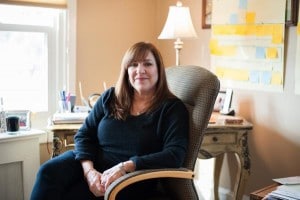 Sandra Vasoli, author of Anne Boleyn’s Letter from the Tower: A New Assessment, earned a Bachelor’s degree in English and biology from Villanova University before embarking on a thirty-five-year career in human resources for a large international company.
Sandra Vasoli, author of Anne Boleyn’s Letter from the Tower: A New Assessment, earned a Bachelor’s degree in English and biology from Villanova University before embarking on a thirty-five-year career in human resources for a large international company.
Having written essays, stories, and articles all her life, Vasoli was prompted by her overwhelming fascination with the Tudor dynasty to try her hand at writing both historical fiction and non-fiction. While researching what would eventually become her Je Anne Boleyn series, Vasoli was granted unprecedented access to the Papal Library. There she was able to read the original love letters from Henry VIII to Anne Boleyn—an event that contributed greatly to her research and writing.
Vasoli currently lives in Gwynedd Valley, Pennsylvania, with her husband and two greyhounds.
Sources
- Ives, Eric. The Life and Death of Anne Boleyn, Blackwell Publishing, London 2004. P 58
- Ridley, Jasper, Henry VIII The Politics of Tyranny, Viking, New York, 1985
- Weir, Alison, The Lady in the Tower, Random House, 2010
